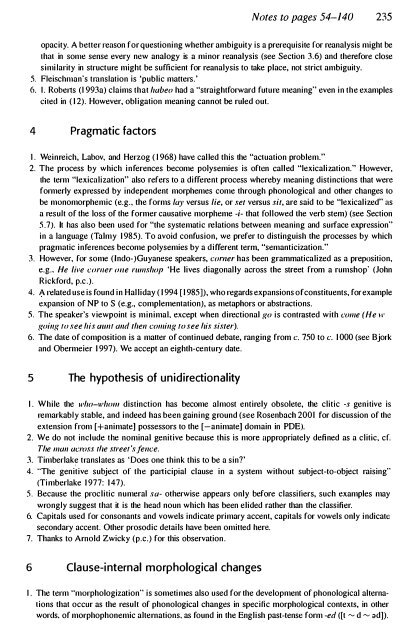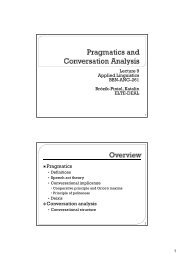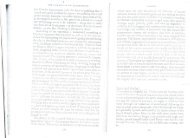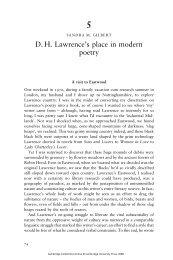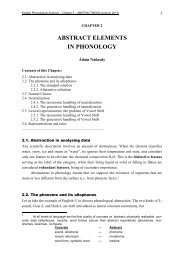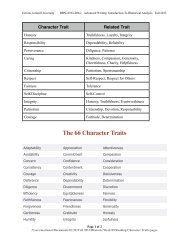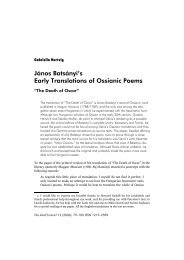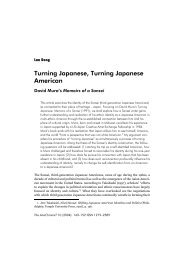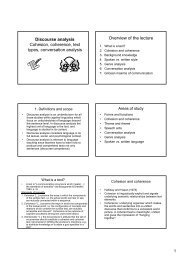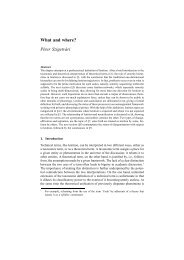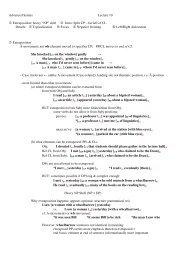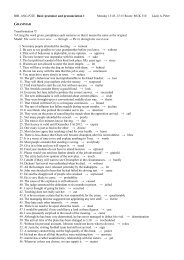Gram - SEAS
Gram - SEAS
Gram - SEAS
You also want an ePaper? Increase the reach of your titles
YUMPU automatically turns print PDFs into web optimized ePapers that Google loves.
Notes to pages 54-/40 235<br />
opacity. A better reason for questioning whether ambiguity is a prerequisite for reanalysis might be<br />
that in some sense every new analogy is a minor reanalysis (see Section 3.6) and therefore close<br />
simi larity in structure might be sufficient for reanalysis to take place, not strict ambiguity.<br />
5. Fleischman's translation is 'public matters.'<br />
6. I. RObel1s (I 993a) claims that habeo had a "straightforward future meaning" even in the examples<br />
cited in (12). However, obligation meaning cannot be ruled out.<br />
4 Pragmatic factors<br />
I. Weinreich, Labov, and Herzog (1968) have called this the "actuation problem."<br />
2. The process by which inferences become polysemies is oftcn called "Iexicalization." However,<br />
the term "Iexicalization" also refers to a different process whereby meaning distinctions that were<br />
formerly expressed by independent morphemes come through phonological and other changes to<br />
be monomorphemic (e.g., the forms lay versus lie, or set versus sit, are said to be "Iexicalized" as<br />
a result of the loss of the former causative morpheme -i- that followed the verb stem) (see Section<br />
5.7). It has also been used for "the systematic relations between meaning and surface expression"<br />
in a language (Talmy 1985). To avoid confusion, we prefer to distinguish the processes by which<br />
pragmatic inferences become polysemies by a different term, "semanticization."<br />
3. However, for some (Indo-)Guyanese speakers, comer has been grammaticalized as a preposition,<br />
e.g . . He lil'e comer olle rumshop 'He lives diagonally across the street from a rumshop' (John<br />
Rickford, p.c.).<br />
4. A related use is found in Halliday (1994 [1985]), who regards expansions of constituents, for example<br />
expansion of NP to S (e.g., complementation), as metaphors or abstractions.<br />
5. The speaker's viewpoint is minimal, except when directional go is contrasted with come (He lI'<br />
goillg to see his Wlllt alld thell comillg to see Ilis sister).<br />
6. The date of composition is a matter of continued debate, ranging from c. 750 to c. 1000 (see Bjork<br />
and Obermeier 1997). We accept an eighth-century date.<br />
5 The hypothesis of unidirectionality<br />
I. While the II'ho-lI'holll distinction has become almost entirely obsolete, the clitic -s genitive is<br />
remarkably stable, and indeed has been gaining ground (see Rosenbach 200 I for discussion of the<br />
extension from [+animate] possessors to the [-animate] domain in POE).<br />
2. We do not include the nominal genitive because this is more appropriately defined as a clitic, cf.<br />
The mall acmss tIle street 'sfellce.<br />
3. Timberlake translates as 'Does one think this to be a sin?'<br />
4. "The genitive subject of the participial clause in a system without subject-to-object raising"<br />
(Timberlake 1977: 147).<br />
5. Because the proclitic numeral sa- otherwise appears only before classifiers, such examples may<br />
wrongly suggest that it is the head noun which has been elided rather than the classifier.<br />
6. Capitals used for consonants and vowels indicate primary accent, capitals for vowels only indicatc<br />
secondary accent. Other prosodic details have been omitted here.<br />
7. Thanks to Arnold Zwicky (p.c.) for this observation.<br />
6 Clause-internal morphologica l changes<br />
I. The term "morphologization" is sometimes also used for the development of phonological alternations<br />
that occur as the result of phonological changes in specilic morphological contexts, in other<br />
words, of morphophonemic alternations, as found in the English past-tense form -ed ([t d 3d]).


